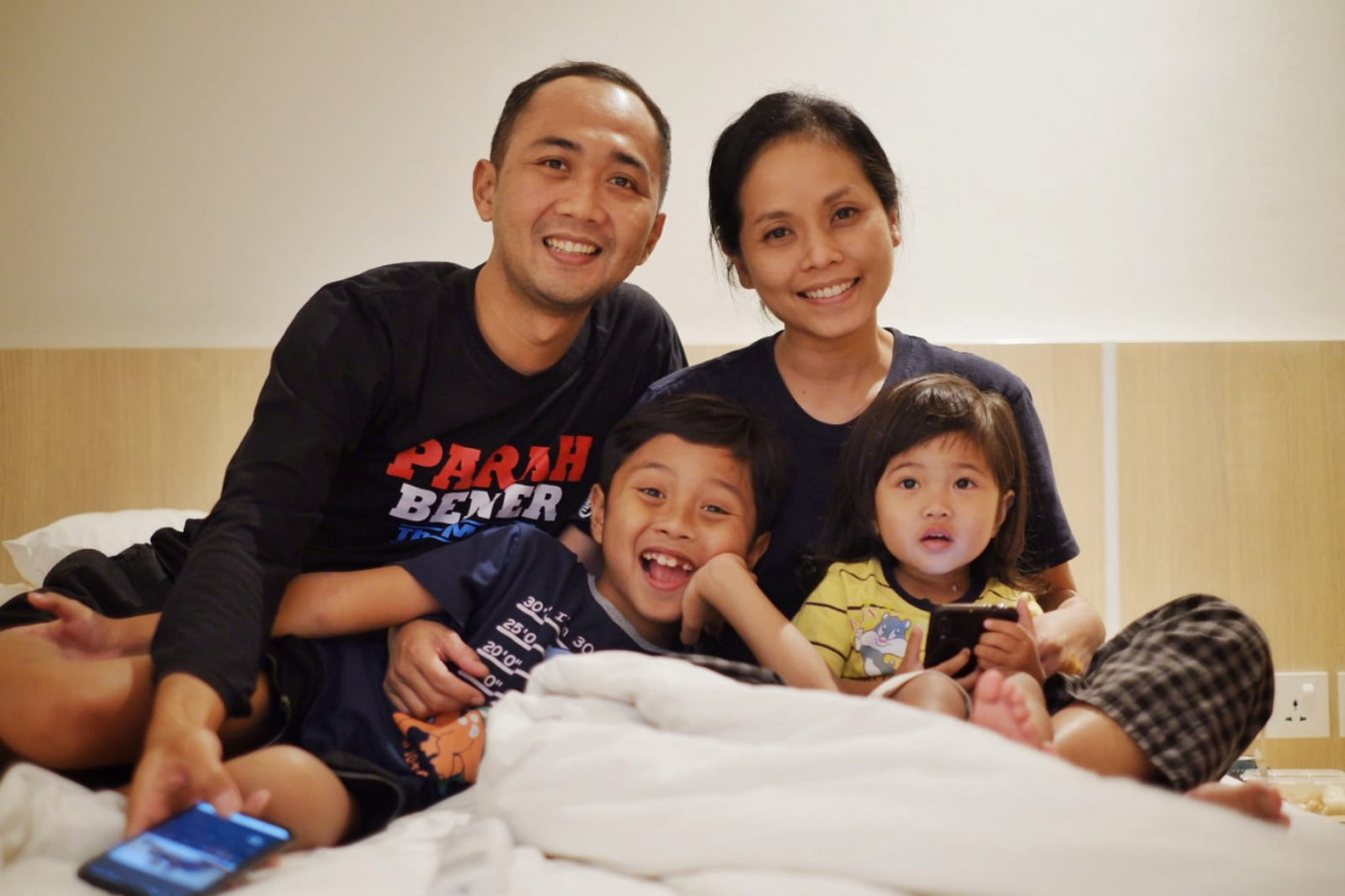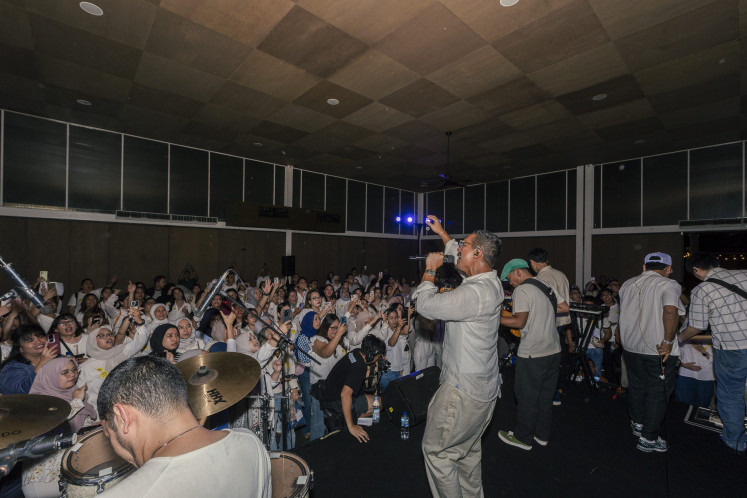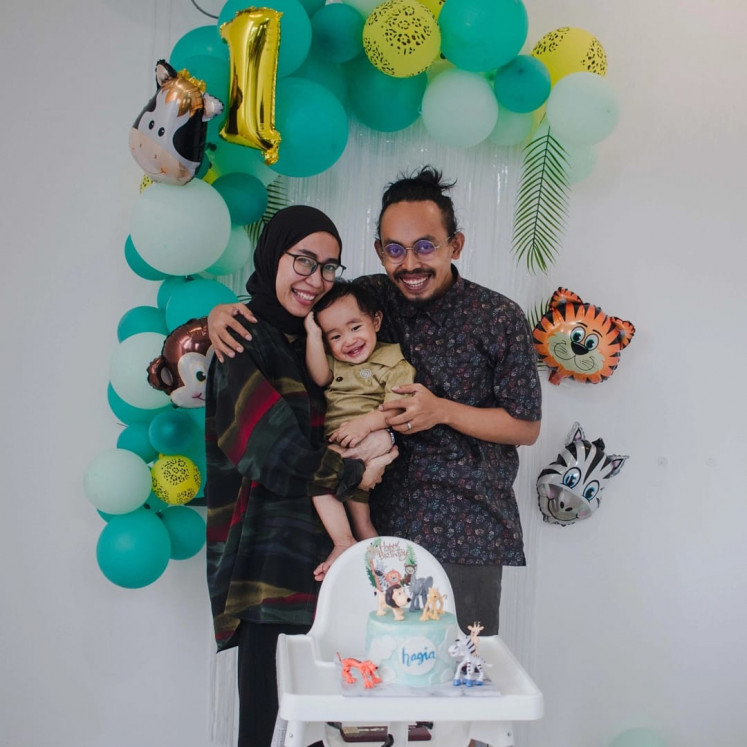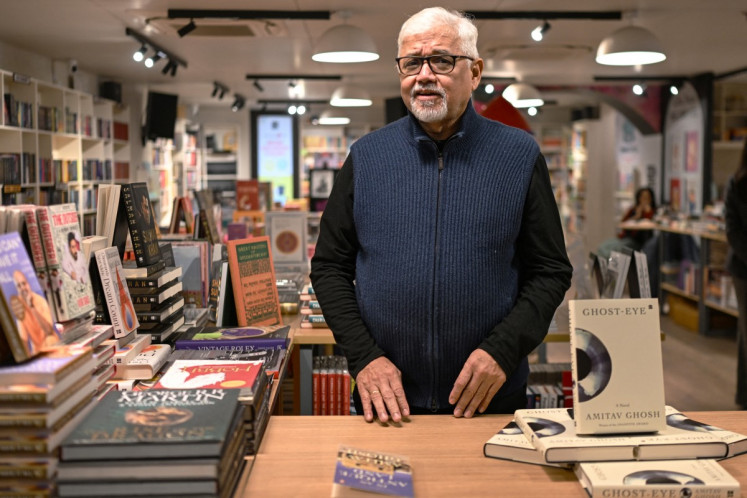Popular Reads
Top Results
Can't find what you're looking for?
View all search resultsPopular Reads
Top Results
Can't find what you're looking for?
View all search resultsReal work, real joy: Indonesian stay-at-home dads talk stigma and emotional rewards
Change text size
Gift Premium Articles
to Anyone
A growing number of Indonesian fathers are staying home to be with their children.
Suwandi Adi, 35, is an out and proud stay-at-home dad.
In an interview with The Jakarta Post on Nov. 10, Suwandi shared that he felt secure in his role as a stay-at-home dad, but that feeling may not be shared by others like him. He pointed to them “maybe [being] embarrassed” for not working an office job.
“Me? No problem,” the Jakarta-based father said.
The self-assurance comes from long-term planning and research. Suwandi and his wife, financial planner Annisa Steviani, 33, have been married for more than eight years. Even before tying the knot, Suwandi already expressed his willingness to do all of the household chores – except ironing and folding laundry.
“It’s not because I don’t want to – I’m just bad at doing those two things,” he added, laughing.
A matter of practicality
Suwandi initially worked in the IT field in addition to homemaking – and then the COVID-19 pandemic hit. Between working from home until 10 p.m. and getting up early in the morning for meetings, running domestic chores was too overwhelming for Suwandi.
“At one point, I made an appointment with a psychiatrist and I was prescribed pills for my anxiety,” Suwandi said, adding that their son, Xylo – now 7.5 years old – also suffered from anxiety disorders because of the pandemic.
Focus: Suwandi Adi, 35, and his wife Annisa Steviani, 33, and their son Xylo, 7.5. (Courtesy of the family) (Personal collection/Courtesy of the family)Suwandi and his wife then agreed it would be wise for him to be a full-time, stay-at-home father, ensuring that their son got the proper parental attention he required. It was about putting Xylo’s mental well-being before any financial incentives offered by a job.
“I have zero income – all of the money comes from my wife,” he said.
Suwandi said his father inspired him, having done the majority of domestic chores at home, in addition to working a full-time job as a civil servant.
“My father comes from the boomer generation, yet he has inspired me,” Suwandi said.
Stefanus Indra Bayu from Balikpapan, East Kalimantan, used to work for a mining company that required him to be away from home – after five years, he decided to make a change.
“I came across a job ad that, while not related to my previous job, allowed flexibility in terms of work location,” the 38-year-old said.
Stefanus applied for the position in 2017 and has felt at ease ever since, adding that his current work allowed him to be there especially for his eldest kid, Reno, 8, who studies online due to the pandemic.
For Andhika Rahmaditya, 33, who has been working in customer support since 2018, working from home allows him to give more attention to his son, Hagia, who was born in September 2020.
“Now that it is time to gradually wean my toddler off breastfeeding, I have time to cook fresh food for him. This is the privilege that I have in comparison to other office workers,” he said.
Stigma
For those who live in Indonesia, the stay-at-home dad role might raise eyebrows.
Stefanus mostly stays at home for almost 24 hours while his wife, Windy Krisanti Kusuma Dewi, 38, a neurologist, goes to work. Stefanus recalls a neighbor asking him how he has kept busy in recent times.
“I know what they really meant was: What job do you actually do? I simply said that I work for an Australian company and it allows me to work remotely,” he said.
Stefanus found solace in Windy – who never once raised an issue with the decision. While conceding that he did not make as much in comparison to his days in the mining business, Stefanus said the most important thing was to be physically and emotionally there for his wife and kids.
“My parents were concerned at first as they did not believe my job could actually generate income. I understand the concern. Not many people are aware of this kind of work, especially before the pandemic,” he said.
Separately, Andhika expressed that his parents – who live next door to him and his wife, Anggraeni Huslul Khotimah, 30 – often received questions from their friends about his situation. Questions such as: Why is your son at home? Is he not working?
Happy together: Andhika Rahmaditya, 33, his wife Anggraeni Huslul Khotimah, 30, and their son Hagia. (Courtesy of the family) (Personal collection/Courtesy of the family)“Personally, I don’t care what others think,” said Andhika, who lives in Bekasi, West Java.
Similarly, Suwandi said he did not mind what others thought about his role as a stay-at-home dad – insisting that he knew his merit and that being a full-time father was, at the end of the day, a job.
“It’s not like I just wake up in the morning and proceed to focus on pet birds while wearing a sarong, then spend the rest of the day doing nothing. I work hard as well to run the house,” he said.
Interestingly, it was Suwandi’s wife, Annisa, who received criticism.
“When our son Xylo was three months old, we often put him at a daycare near my office at the time as my wife and I were both working. Since I was the one who picked my son up – they’d ask why my wife was never there,” he said.
Annisa expressed that she would receive criticism from people who did not understand why she was the main breadwinner. She ignored such criticisms and refused to bow down to other people’s standards.
“I can’t be any happier. Since my husband resigned, my son never feels lonely. The house is tidy and I can work calmly because my husband always takes care of preparing the meals,” she said with a smile.
Tips
Thirty-year-old Dimas Triaji in Cilacap, Central Java who became a stay-at-home father after his laundry business folded and found a remote job, conceded that there were challenges that came with the territory.
“The advantage of working from the office is that, when you work, you can focus 100 percent on the work. Whereas working from home can be difficult with the distractions – such as when your kids suddenly cry, for example,” said Dimas.
Full-time gig: Dimas Triaji, 30, with his wife Paras Putri Diana, 26, and their daughter Odelia Renata, 1. (Courtesy of the family) (Personal collection/Courtesy of the family)Dimas recommended young fathers who work from home have a designated space just for working in order to minimize any distractions. However, the ultimate key is patience.
“Sometimes your kids want to play with you or with your laptop while working – so you have to be patient,” he said, adding, “But don’t worry! Sometimes you will also get extra motivation from your kids because they will entertain you with their cuteness.”
Stefanus chimed in and recommended a family outing once a week to avoid burnout.
“Being in the same space over and over again is not good for your mental health – even if it’s your own house.”














